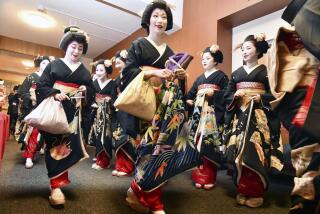Japan Faulted for Lack of Alcoholic Care
- Share via
TOKYO — Japan can be a cold-hearted place for people who fall through the cracks. For those who drink too much and cease to function, the government provides little more than hospitalization and a life under sedation, according to therapists.
“In Japan, alcoholics and drug addicts are regarded as evil rather than ill,” said Roy Assenheimer, a 51-year-old Catholic priest from the United States who works with alcoholics in Tokyo’s Skid Row.
“Routinely they are committed to prison for punishment or confined to mental hospitals, where they are kept quiet with tranquilizers,” Assenheimer, himself a recovering alcoholic, said.
In a land of rising affluence, more than 100 alcoholics die on Japan’s streets every year. “The police just leave them,” he said.
Assenheimer, a Maryknoll missionary from Drexel Hill, Pa., compared the time the police spent on a lost wristwatch and a drunk found dead on the street.
“With the lost watch, they take more than 20 minutes to go through all the red tape,” he said. “With a dead body, it’s all over in three minutes.”
Since time immemorial, Japan has turned a blind eye to the intoxicated.
Anyone walking through the entertainment districts in Japanese cities has to watch out for hordes of shambling drunks, many of them young men in business suits.
Subway and train platforms turn into obstacle courses where travelers dodge pools of vomit. There is never a public outcry at the nuisance.
The lenient attitude is bolstered by readily available supplies of liquor. Beer and even bottles of whiskey are sold from vending machines.
Official Japanese statistics report just over 2 million alcoholics in a population of about 120 million, but Assenheimer and others said that number is far too low.
“They’re only counting people who go into hospitals,” he said. “I couldn’t begin to even guess how many there really are.”
A Health and Welfare Ministry official said government involvement in alcoholic treatment was limited to medication in mental wards.
“We do feel alcoholism is a growing problem and we’re trying to find ways of addressing it,” the official said in a telephone interview.
Psychologist Tsutomu Komazaki said most work with alcoholics was done by foreign, mostly religious, groups.
“There are so many things the government could do, but isn’t doing, about it,” Komazaki said. “It’s so myopic to sweep these problems under the carpet.”
The government’s failure to even admit there is a problem may reflect most people’s attitudes.
“Japanese people think it’s all right to drink till they’re drunk,” Komazaki said. “There’s no sense that it’s bad to get dead drunk.”
There is a low level of awareness about alcoholism and other social problems, Komazaki said.
Assenheimer said he believed the government attitude was that people should simply stop drinking and go back to work.
“If you’re not useful to society, forget it,” he said.
“Alcoholism is like diabetes. It’s incurable, progressive. It causes death. And it’s treatable,” Assenheimer added.
Along with religious and lay colleagues, he runs 12 rehabilitation centers, treating about 300 people at a time.
The Salvation Army also runs an alcoholic treatment center in Tokyo, and a Protestant-affiliated group runs another, he said.
Their free daytime program for alcohol treatment runs three months, involving group meetings three times a day. Funding comes mostly from private donors. Most of those on a recent donors’ list were foreign residents in Japan.
“One of my main purposes is to show the Japanese government models of halfway houses and day-care treatment facilities so some day government agencies will take up the call,” Assenheimer said.
“I provide a place to stay--the love, the hugs,” Assenheimer said. “I stopped trying to change other people and started trying to change myself.”
More to Read
Sign up for Essential California
The most important California stories and recommendations in your inbox every morning.
You may occasionally receive promotional content from the Los Angeles Times.













